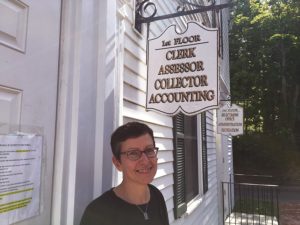WELLFLEET — A half-dozen town officials have said no evidence of wrongdoing has been detected in a municipal accounting mess that dates back to at least July 2018 and has been complicated by the abrupt departure on Dec. 1 of Town Treasurer Miriam Spencer.
But the origins of the mess remain in dispute, raising questions about the town’s annual audits, which failed to reveal huge problems until a new employee blew the whistle. A forensic audit could uncover more details, but town officials see no reason to order one.
Former Town Administrator Dan Hoort, who served from 2016 to 2020, the period during which accounting problems blossomed, sent an email to the select board on Dec. 6 stating that he wanted to “set the record straight.” He wrote that he and his partner, Rob Klytta, are selling their Provincetown bed and breakfast, the Somerset House Inn, and moving to a house “along Lake Michigan” in mid-January.
Hoort’s email blamed the problems on a weak staff. “The financial troubles in Wellfleet are primarily because of two people I hired,” he wrote. Hoort did not identify them by name in his email, but the position titles and time frame make it clear he was referring to Spencer and former Town Accountant Gene Ferrari.
Hoort disputed statements by former town employees and volunteers, reported in the Independent, that he had “checked out” and was “hands off” in his final year as town administrator. In fact, Hoort wrote, the town accountant and treasurer that he had hired were not capable of doing their jobs. Rather than fire them, he wrote, he did their jobs for them.
“I was not ‘hands-off,’ ” Hoort wrote. “In fact I may have been too hands-on.” That, he continued, covered Ferrari’s shortcomings. “When I left things quickly fell apart. He was a bad hire and that was my fault.”
About Spencer, Hoort wrote, “In fiscal year 2019 she had trouble reconciling her cash. I had her give me all the bank statements and financial records. I spent over 100 hours working on reconciling the cash for the 12 months of fiscal year 2019. I spent nights and weekends on it because I wanted to see her succeed. … I’m not sure what more support we could have given her. At some point she has to accept she wasn’t capable of doing the job.”
Hoort’s Role
Former and current staff have pointed to Hoort’s role in the crisis that has drawn state oversight. The Dept. of Revenue has refused to certify the town’s free cash account for two years. (Free cash is unspent money that, once certified by the state, can be used in the following fiscal year.) Also, the town’s auditor, Powers & Sullivan of Wakefield, found a $765,000 “unknown variance” (that is, unreconciled cash) in its review of fiscal 2020 accounts. Total expenditures in the current fiscal year are about $28.5 million.
Fiscal 2020, the 12 months from July 1, 2019 to June 30, 2020, was the year during which Hoort now says he did the town accountant’s job for him.
“Dan Hoort was the finance director in Provincetown before coming to Wellfleet,” said select board chair Ryan Curley. “It’s disappointing that he did not have a handle on this whatsoever, because you would figure somebody that was the finance director would have responded earlier and in a more effective fashion. I don’t think he responded at all.”
Current and previous employees describe chaotic town bookkeeping going back years. Carrie Mazerolle, who was town accountant for six weeks in mid-2019, said the records made no sense when she arrived and that she got no support from Hoort or from Jane Tesson, the long-time assistant town accountant, who has recently returned to work after an extended sick leave. Mazerolle quickly left the job to become the town accountant in Duxbury.
Ferrari was Wellfleet’s accountant from September 2019 to September 2020, when he was fired by the new town administrator, Maria Broadbent.
Ferrari said that, when he was hired in July 2019, Hoort assured him that the fiscal 2019 books would be balanced by the time he started work.
“But none of the books were balanced when I started in late September 2019,” said Ferrari, who is now finance director in Cumberland, R.I. “So the best I could possibly do was look at the year-end financials that were not reconciled or closed. I started with books from 2018, because the 2019 books were not balanced until June 2020 by Dan Hoort.”
Ferrari said he had warned Hoort that both Spencer and Tax Collector Karen Murphy were not qualified to do their jobs. (Murphy is still the tax collector and, according to current interim Town Administrator Charlie Sumner, is doing great work.)
Ferrari said Hoort replied, “ ‘You have to walk before you can run, and these people are town residents. Once you get a job in town you have it for life.’ ” Ferrari took that to mean Hoort would not fire town residents even if they could not do their jobs.
Hoort refused to speak to the Independent this week, saying that the newspaper’s coverage has been biased against him.
No Evidence of Wrongdoing
Two temporary part-time accountants and Sumner have been working to balance the town’s books. After six months, they say they have found no malfeasance.
“I just want to say we have done a lot of work looking at these matters and we just haven’t seen anything that would suggest anything other than a lack of training, incompetence, and high turnover,” Sumner told the Independent.
Spencer, the former treasurer, said, “I know that there’s no malfeasance. There’s nobody pocketing any money. I think it’s accounting and reporting errors. But nothing criminal. We’re not that clever.”
Some officials acknowledged that the process of looking back to make sense of errors and omissions may at some point reveal evidence of wrongdoing. If it does, Sumner said, he will report it.
“My first obligation is to the community and to the select board,” said Sumner. “I have no intention of protecting someone who might have done something possibly illegal.” When asked if it were possible that a former employee had embezzled funds, Sumner said, “I don’t know.”
The state’s Office of the Inspector General often investigates allegations of fraud, waste, and abuse of public funds in conjunction with the attorney general. The office has a hotline that accepts tips, even anonymously.
Audits Don’t Tell All
How did the auditors from Powers & Sullivan miss all the chaos? Contacted by the Independent, audit manager Mike Nelligan refused to comment.
Most Massachusetts towns get a yearly audit. Powers & Sullivan has audited Wellfleet’s books for at least 20 years. The inspector general’s office recommends changing auditors every five to eight years. But in any case, Sumner said, municipal audits have their limits.
Annual audits are not exhaustive, said Barbara Costa, a former town accountant who now works for the Abrahams Group, an audit firm. If you want specifics, you must ask the firm to zero in on them, Costa said.
Every audit, however, comes with a management letter, which spells out deficiencies to be corrected. The 2019 Wellfleet audit stood out because it did not include a management letter.
Though the town accounts were in disarray, Powers & Sullivan, who are about to begin the last year of a three-year auditing contract, acknowledged nothing until the 2020 audit, in which they found a material weakness in cash management and the $765,000 variance.
Sumner said that audit was detailed because Heather Michaud, who had just been hired as town accountant, notified the auditors of her grave concerns. Michaud resigned after only four months in April 2021.
Spencer said Michaud had requested a management letter that would “spell out everything we needed to fix — that would call the board of selectmen to do something, to take action. The management letter was scathing. Heather asked for it. We needed it.”
Finance committee member Fred Magee said there is plenty of blame to go around in this crisis. But one solution is for the finance committee to become more of a watchdog.
“We will be asking for monthly reports from the department heads, so if we perceive things going off the rails, we can notify the select board or the town administrator,” said Magee.
His committee will also be asking for more specifics in the town administrator’s reports. “We want less English and inspiration and more financials,” he said.


